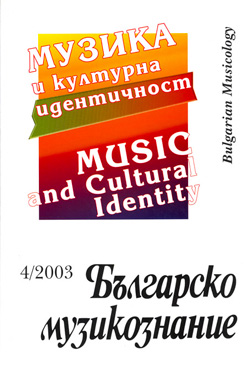Балкански Groove: постетнически размишления на тема далечна музика и пожеланото друго
Balkan Groove: Postethnic Reflections on Distant Music and the Desired Other
Author(s): Claire LevySubject(s): Music
Published by: Институт за изследване на изкуствата, Българска академия на науките
Summary/Abstract: “By being geographically inextricable from Europe, yet culturally constructed as “the other” within, the Balkans have been able to absorb conveniently a number of externalized political, ideological, and cultural frustrations stemming from tensions and contradictions inherent to the regions and societies outside the Balkans” (Todorova 1997: 188). Following such reflections which point to the ideological reasons for negative attitudes towards Balkan music, often conceptualized as the non-desired other at home, within the national discourse of Bulgaria and within the Balkans in general, this paper develops the discussion further to focus on the interior dynamics within the Western discourse itself. More particularly, it focuses on Balkan music in non-Balkan contexts, performed and seen, unlike its predominant qualifications at home, as the desired other. Observing western pop groups who embrace Balkan music vocabulary as a source of cultural identity, the discussion draws attention to a possible cultural “insufficiency” which may feed the western interest to distant others including the one embodied in the music of the Balkans. Taking the example of several cover versions of “Krivo Sadovsko”, functioning in different western contexts, it is argued that the Balkan groove -that is, the particular meter and rhythmic asymmetry, observed all over the Balkans and hinting particular unevenness not only in music but in lifestyles as well, - may be further analyzed as one of the qualities which attracts and challenges Western audiences. Understanding cultural identity as a dynamic dialogical process and not as a frozen reproductive category, it is argued as well that late modernity questions essentialisms in general and that within the Western discourse itself new paradigms emerge -ones which promote postethnic perspectives in identities through music, pluralistic views and non-centric ideas capable to take free-of-biases approaches in conceptualizing and appreciating Western Others’ cultural values.
Journal: Българско музикознание
- Issue Year: 2003
- Issue No: 4
- Page Range: 75-82
- Page Count: 8
- Content File-PDF

